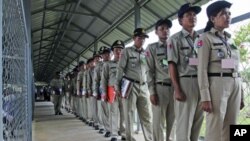Cambodia's troubled Khmer Rouge war crimes tribunal said Monday that striking employees have agreed to return to work after they were promised they would receive their December salaries this week.
But, the translators and transcribers warned that they would walk out again on April 1st, if their contracts are not renewed by the end of the month. They walked out on March 4th, after not being paid since November.
The United Nations pays the wages of the international employees, the Cambodian government is responsible for the salaries of national staff.
Since the court opened in 2006, the government has contributed around $15 million cash and in-kind aid to the tribunal, but has relied on foreign donors to foot a large portion of the wages bill.
Earlier this month, government spokesman Ek Tha said that donors are reluctant to pay, because they have to contend with their own financial issues. He insists the government is committed to the tribunal and is adamant that it will not collapse.
The Khmer Rouge's former foreign minister, Ieng Sary, died in Phnom Penh last week at age 87. He was one of three defendants in the genocide trial of the former leaders of the Khmer Rouge.
With the death of Ieng Sary, who was the third-ranking person in the Cambodian Communist party, just two defendants remain: Nuon Chea, the Khmer Rouge's chief ideologue, who is also known as Brother Number Two; and the former head of state, Khieu Samphan.
Nuon Chea is 86 and was hospitalized in January, although he has now recovered. Khieu Samphan, who is 81, is still in reasonable health.
But, the translators and transcribers warned that they would walk out again on April 1st, if their contracts are not renewed by the end of the month. They walked out on March 4th, after not being paid since November.
The United Nations pays the wages of the international employees, the Cambodian government is responsible for the salaries of national staff.
Since the court opened in 2006, the government has contributed around $15 million cash and in-kind aid to the tribunal, but has relied on foreign donors to foot a large portion of the wages bill.
Earlier this month, government spokesman Ek Tha said that donors are reluctant to pay, because they have to contend with their own financial issues. He insists the government is committed to the tribunal and is adamant that it will not collapse.
The Khmer Rouge's former foreign minister, Ieng Sary, died in Phnom Penh last week at age 87. He was one of three defendants in the genocide trial of the former leaders of the Khmer Rouge.
With the death of Ieng Sary, who was the third-ranking person in the Cambodian Communist party, just two defendants remain: Nuon Chea, the Khmer Rouge's chief ideologue, who is also known as Brother Number Two; and the former head of state, Khieu Samphan.
Nuon Chea is 86 and was hospitalized in January, although he has now recovered. Khieu Samphan, who is 81, is still in reasonable health.







